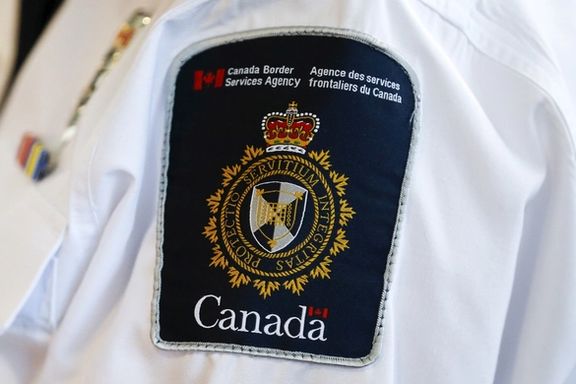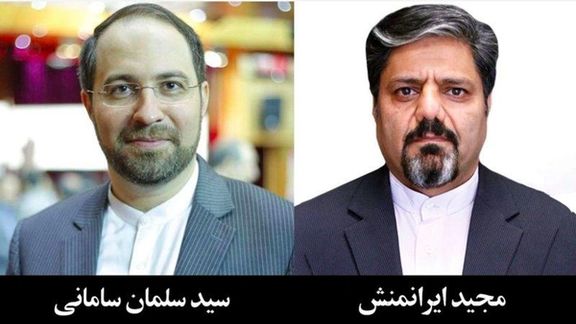Another Iran Ex-Official Facing Deportation From Canada

Canada is about to deport a former high-ranking Iranian government official as part of efforts to ban senior regime figures from seeking refugee status there.

Canada is about to deport a former high-ranking Iranian government official as part of efforts to ban senior regime figures from seeking refugee status there.
Appearing before an immigration panel on Thursday, Majid Iranmanesh, who was a director general at Iran's Vice-Presidency for Science and Technology, asked the court to allow him to leave the country voluntarily without a deportation order, which he said would interfere with his research in different countries.
“I would like to return to my country,” he said, claiming that he would leave Canada next week. Although his employment ended in 2020, he is still an Iranian government contractor.
Iranmanesh is one of nine alleged senior members of the Iranian regime who face possible deportation. He said in the hearing that he arrived in Canada on May 29, 2023, with the intention of conducting research at the University of Victoria for one year. The Canada Border Services Agency has said it was investigating 141 such cases. Thirty-eight have been closed without action.

Immigration, Refugees, and Citizenship Canada did not provide details on how Iranmanesh secured a visa to enter the country. Canada Border Services Agency referred his case to the Immigration and Refugee Board for hearings in November.
He is found inadmissible to Canada because he is a senior official, and if the Refugee Board concurs, a deportation order will be issued under sanctions adopted in November 2022 that banned senior members of the Iranian regime from Canada.
In his testimony, he acknowledged working for the Iranian government since 2017. He admitted that he was the director general of administration of information technology at the Vice-Presidency for Science and Technology until 2020, and since then he has been a consultant working on contract.
The Vice-Presidency for Science and Technology oversees operations of the Centre for Innovation and Technology Cooperation (CITC), which has been sanctioned by the United States and United Kingdom for supporting Iran’s nuclear and missile programs. “The Center for Innovation and Technology Cooperation is in a position to support a range of Iran’s weapons of mass destruction and military procurement objectives,” according to the US Treasury.
Iranmanesh, a 53-year-old mathematician, claimed that he has “been active in positions only for the benefit of humankind.”
Earlier this month, Iran’s former deputy interior minister under president Hassan Rouhani, Salman Samani, also appeared before the Refugee Board in Toronto. His case is scheduled to be reviewed in February.
According to Bill Blair, the Minister of National Defense, “When individuals have been involved in activity that would make them ineligible to be in this country, we’ll do everything we can to keep them out. And when they do get into this country, we’ll do everything we can to remove them.”
The deportations are in line with sanctions, imposed after Iran's morality police killed Mahsa Amini for defying hijab laws in September 2022. Amini's death garnered international condemnation and became a poignant symbol of resistance against the repression of women under Iran's clerical government.
In response, Canada classified Iran's government as a regime involved in "terrorism and systematic and gross human rights violations," leading to the effective exclusion of tens of thousands of Iranian officials and Islamic Revolutionary Guard Corps members from entering the country.
Canada’s ban applies to “a wide array of individuals in a regime that has perpetrated crimes against the people of Iran and other nations,” the government said when the policy was announced. “It includes: heads of state, members of the Cabinet, ambassadors, senior diplomats, members of the judiciary, senior military and intelligence officials and senior public servants.”
Canada severed diplomatic ties with Iran in 2012 due to concerns related to its pursuit of nuclear weapons and support for terrorist organizations including Hamas.
In an event to mark four years since Iran’s Revolutionary Guards downed Flight PS752 earlier this week, Canada’s Prime Minister Justin Trudeau said his government is looking at ways to label the IRGC a terrorist organization. Canada has been wrestling with designation of the IRGC as a terrorist entity for years, but calls grew louder after the Flight PS752 incident. Canada’s federal government has referred to the IRGC as a terrorist organization, described its leadership as terrorists, announced measures to make its senior members inadmissible to Canada, and has listed the outfit’s extraterritorial expeditionary division Quds Force as a terrorist entity.